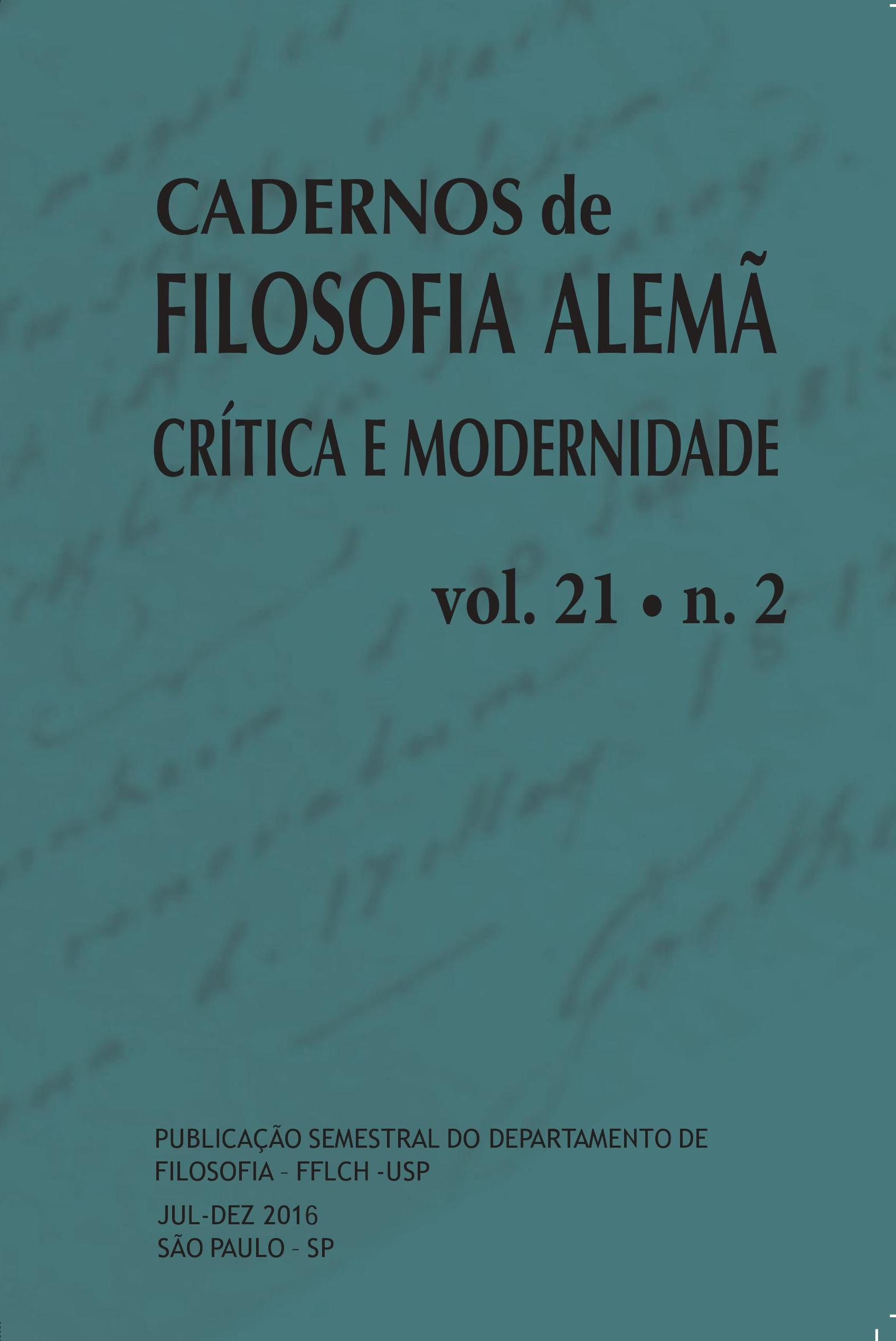Boundaries and contradictions of pure reason, between the Dissertatio (1770) and the Critique of pure reason (1781)
DOI:
https://doi.org/10.11606/issn.2318-9800.v21i2p49-59Keywords:
Kant, antinomy, reason, boundaries, metaphysics.Abstract
In this paper I claim that it is possible to find a particular stage in the development of the Antinomy of pure reason, understand as a conflict of reason whit itself. This stage is placed between 1770 and 1781 and consists in a conflict which arises in reason itself but between the functions that later will be assigned to pure understanding and pure reason in strict sense.Downloads
References
Adickes, E. (1925). „Einleitung in die Abtheilung des Handschriftlichen Nachlasses“. En AA: 14.
Baumgarten A. G. (1760). Initia Philosophiae practicae acroamatice scripsit: Halle.
Heimsoeth, H. (1967). Transzendentale Dialektik. Ein kommentar zu Kants Kritik der reinen Vernunft. Zweiter Teil. Berlin: Walter de Gruyter & Co.
Heinze, M (1894). Vorlesungen Kants über Metaphysik aus drei Semestern. Abhandlungen der königlich Sächsischen Gesellschaft der Wissenschaften. 34. Band. Des XIV. Bandes der Abhandlungen der philosophisch-historischen Classe der Königl. Sächsischen Gesellschaft der Wissenschaften No. VI.: Leipzig.
Hinske, N. (1965). Kants Begriff der Antinomie und die Ettappen seiner Ausarbeitung. Kant-Studien, 56, pp.485–496.
____________. (1970). Kants Weg zur Transzendentalphilosophie. Der dreißigjährige Kant. W. Stuttgart – Berlin – Köln – Mainz: Kohlhammer Verlag.
____________. (1980). „Reimarus zwischen Kant und Wolff“. En Borinski, L. und Walter, W. (Hrgb.). Logik im Zeitalter der Aufklärung. Studien zur „Vernunftlehre“ von Hermann Samuel Reimarus. Göttingen: Vandenhoeck & Ruprecht.
Kant, I. (1900 y ss = AA). Gesammelte Schriften Hrsg.: Bd. 1-22 Königlich Preussische Akademie der Wissenschaften, Bd. 23 Deutsche Akademie der Wissenschaften zu Berlin, ab Bd. 24 Akademie der Wissenschaften zu Göttingen: Berlin.
____________. (2009). Crítica de la razón pura. Traducción, notas e introducción de Mario Caimi. Buenos Aires: Colihue.
Klemme, H. F. (1996). Kants Philosophie des Subjekts. Systematische und Entwicklungsgeschichtliche Untersuchungen zum Verhältnis von Selbstbewußtsein und Selbsterkenntnis. Hamburg: Meiner.
Mellin, G. S. A. (1797). Enzyclopädisches Wörterbuch der kritischen Philosophie. Erster Band: Züllichau und Leipzig.
Moledo, F. (2016). Die neue Auffassung der Metaphysik als reine Philosophie in der Inauguraldissertation und ihre propädeutische Bedeutung im Rahmen der Entwicklungsgeschichte der KrV. Kant-Studien, 107, pp.485-495.
Naragon, S. (2000). The Metaphysics Lectures in the Academy Edition of Kant´s gesammmelte Schriften. Kant-Studien, 91, pp.189–215.
Oberhausen, M. (1997). Das neue apriori. Kants Lehre von einer „ursprünglichen Erwerbung“ apriorischer Vorstellungen. Forschungen und Materialien zur deutschen Aufklärung (FMDA) herausgegeben von Norbert Hinske. Frommann-Holzboog: Stuttgart – Bad Canstatt.
Schmid, C. C. E. (1795). Wörterbuch zum leichtern Gebrauch der Kantischen Schriften nebst einer Abhandlung: Jena.
Schmitz, H. (1989). Was wollte Kant? Bonn: Bouvier Verlag.
Downloads
Published
Issue
Section
License
Information and conceptions on the texts are complete responsibility of the authors.
All the articles submitted before July 5th 2018 and those published after July 2021 are licensed under a CC BY-NC-ND license – except those published between the aforementioned dates, which are under the CC BY-NC-SA license. The permission for the translation of the material published under the license CC BY-NC-ND by third parts can be obtained with the consent of the author.
Open access policies - Diadorim
Rules applied before July 5th 2018:
Presenting a submission to our Editorial Board implies granting priority of publication for “Cadernos de filosofia alemã”, as well as transferring the copyright of texts (once published), which will be reproduced only with the manifest authorization of the editors. Authors keep the right to reuse the texts published in future editions of their work, without paying any fees to "Cadernos”. We will not grant the permission to re-edit or translate the texts for third parts without agreement of the author.


